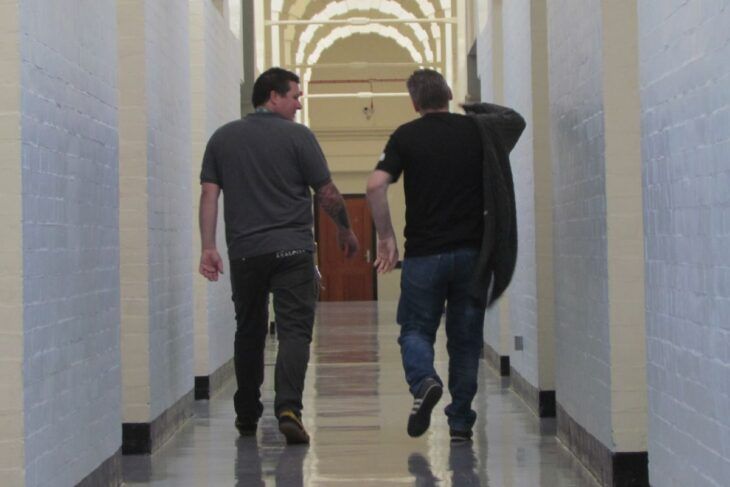Prison lockdowns: two years on

HMP Coldingley
Going into lockdown was a very different experience – feeling very opposite to what life was like in Coldingley before the pandemic. It felt empty with all the prisoners locked in the cells. Because of all the rules on social distancing, we were limited not only in terms of being allowed face-to-face contact with clients, but also in how many people were allowed in the office at any one time. As a result, two-three working days in prison (down from five days week beforehand) became the norm for a while. At the peak we could only see a client if they were in crisis. Despite the challenges, we adapted our service to meet our clients’ needs as best we could. As a team we were all there to support each other, which I feel carried us all through, for us and our clients. Lockdown in my own life felt like a slight insight into what our clients face each day, away from family, support systems, and so on. Covid reminded me of the importance of the work we do with our clients, and I am grateful for that.
Isabel Taylor, Wellbeing and Recovery Practitioner
HMP Stoke Heath
At the beginning of the pandemic there was a heightened level of anxiety in the team and a level of uncertainty about what was going to happen and how we were going to continue to deliver the psychosocial service that we’d been contracted to do by the NHS.
Working during lockdown presented a whole set of challenges, alongside increased anxiety and stress within our team and throughout the prison. Although this was a difficult period, the team did their best. The way we worked had to change and I feel our team responded to this challenging time extremely well. We sent out activity/distraction packs and lists of in-cell work to our clients and continued to check in with our caseloads, doing health and wellbeing checks and one-to-one work when able to. Clients were grateful for our support, especially as, for long periods during lockdowns, we were the only team offering face-to-face contact.
It has been a difficult and challenging time trying to deliver a service throughout the continuing changes of the prison regime but the whole team has responded to the changes and continued to deliver the best possible support. I found my job extremely stressful and felt close to burnout at times. However, I found using external supervision, practicing mindfulness, regularly using the Headspace app provided by Forward, and doing yoga and physical exercise really helpful during this time. Lockdown also allowed me the opportunity to start a 12-step programme with several prisoners, one of whom managed to get to step 9, which he continued when he moved into a different unit. I found this an extremely rewarding experience as I witnessed how they were benefiting from doing this work during lockdown. I believe that this whole experience has reinforced the need to maintain good self-care.
Matthew Stodart, Team Leader
HMP Elmley
Anyone who has worked in a custodial environment will almost certainly agree that even at the best of times it can be a challenge and the Covid pandemic and lockdowns were certainly not the best of times for both residents and staff alike. During the first and second lockdown I was the service manager of our clinical and psychosocial substance misuse service at HMP Elmley. The day after the country went into a national lockdown, we had to transform our service delivery to make it work in this unknown time. The psychosocial practitioners went onto restricted rotas and formed bubbles with their colleagues, alternating between working one week in the unit and the one week working from home to reduce the number of staff on site. Our client contact was severely reduced and the residents faced extreme restrictions to their regime for longer than any of us predicted. At the peak of restrictions, they had 30 minutes a day outside of their cells to get their medication, shower, collect their meal and, if they were lucky, get a brief spell of fresh air in the exercise yard.
Staff continued to work despite their own anxieties, personal challenges they were facing and the devastating loss of two much loved colleagues. As a team we tried to support the clients as best as we could. This included sending out activity and distraction packs and running a poetry and creative writing recovery competition. Service users were also contacted monthly to see if there were any in-cell packs they wished to complete.
Restrictions and access fluctuated. Sometimes a fresh outbreak would hit just as restrictions were easing and we were back to limited access, with outbreak units being off limits for practitioners unless it was essential. Managing an ever-changing landscape was tough, practitioner’s duties changed regularly including the mass Covid testing of residents to support our primary care colleagues and we felt the impact of extremely low staffing. The team did this and continued to think of new and creative ways to support our clients despite minimal face-to-face contact, one of the positives of the experience is that some of the new initiatives that were created during this time will remain part of service delivery beyond Covid as they were so well received.
I can honestly say that in all my years working in the prison environment, the Covid pandemic is one of the most difficult circumstances I have encountered and is certainly not one I would like to experience again. Without the support of the team, Forward managers and prison governors alongside the acceptance of our clients that restrictions were necessary, it would have been impossible to manage, let alone gain such positive recognition from HMIP inspectors during their scrutiny visit.
Stacey Budds, Service Development Manager